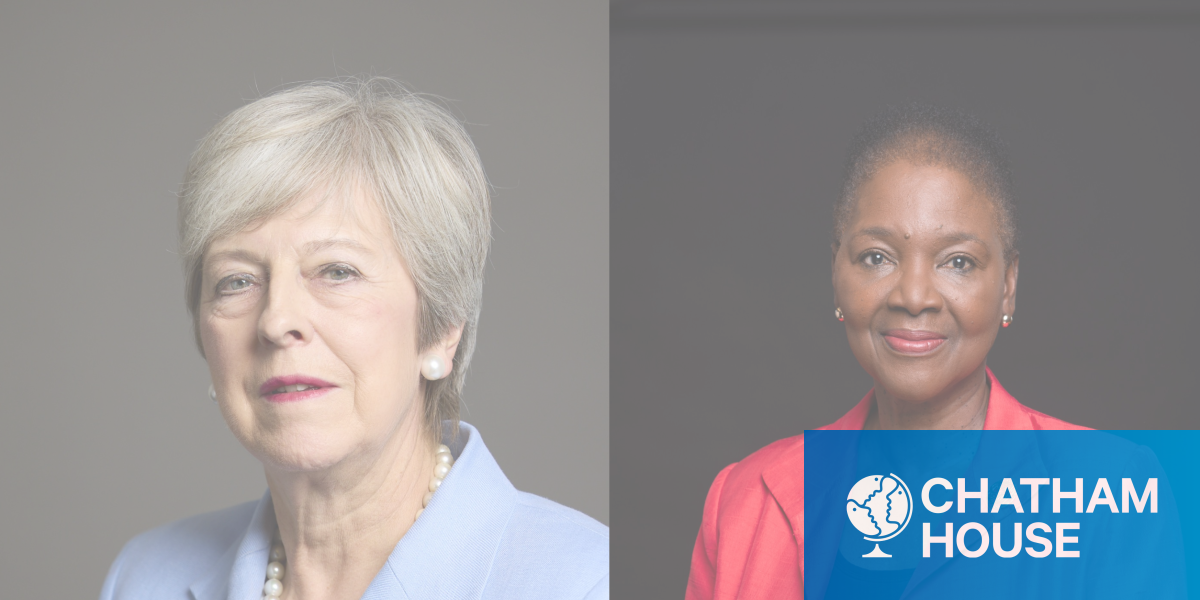New presidents of Chatham House
News release
krousseau.drupal
3 September 2025
Valerie Amos and Theresa May were approved as Chatham House’s new presidents at the Institute’s AGM on 2 September.
Valerie Amos and Theresa May have been appointed as new presidents of Chatham House, the international affairs think-tank.
They will join former New Zealand Prime Minister Helen Clark in what will be the first all-female presidential line-up of the Royal Institute of International Affairs in its 100-year history.
They replace Baroness Eliza Manningham-Buller and Mark Carney, who stepped down earlier this year. Their appointments were approved at the Institute’s AGM on 2 September. The Rt Hon Baroness Amos LG CH and the Rt Hon the Baroness May of Maidenhead will each serve a three-year term. Baroness May will take up her post immediately and Baroness Amos in May 2026.
Bronwen Maddox, Director and CEO of Chatham House, said: ‘We are truly delighted that Baronesses May and Amos will be joining us. Our presidents play a key role in overseeing the independent governance of the Institute and between them, they bring a wealth of global experience and expertise to the House.
‘We look forward to their involvement and engagement over what looks likely to be more challenging and extraordinary times to come in the world of international affairs.’
Chatham House presidents underpin the Institute’s independent, non-partisan voice on international affairs. The presidents confirm, through their experiences at the highest levels of government and diplomacy, the connection between the House and policymakers. Presidents Amos, Clark and May will serve alongside former Institute President and UK prime minister the Rt Hon Sir John Major KG CH, who remains as President Emeritus.
Baroness Amos was United Nations Under-Secretary-General for Humanitarian Affairs and Emergency Relief Coordinator from 2010-2015. She was a UK Cabinet Minister from 2003-2007, serving as Secretary of State for International Development and Leader of the House of Lords. She has also served as UK High Commissioner to Australia.
Since September 2020 she has been Master of University College, Oxford and before that was Director of SOAS, University of London.
Her interests include foreign policy and development matters, social justice, education, equality and inclusion. She is on the board of the Mastercard Foundation, UN Foundation, Mission 44 and International Peace Institute. She is also a member of the advisory board of the Mo Ibrahim Foundation and Patron and Co-Founder of the Amos Bursary.
Baroness May was the United Kingdom’s second female prime minister (2016–2019) and was the longest-serving Conservative Home Secretary in more than a century (2010–2016).
Baroness May’s years in office coincided with a period of profound political and global change and she has extensive experience in defence, security, and international affairs. As prime minister, she led complex Brexit negotiations, worked closely with the first Trump administration, and managed a broad range of high-level domestic and international security challenges. She can provide a rare level of insight into the demands of leadership at the highest level, the intricacies of global diplomacy, and the evolving nature of democracy in a rapidly shifting world. She is also a Senior Fellow at the Jackson School of Global Affairs, Yale University.

